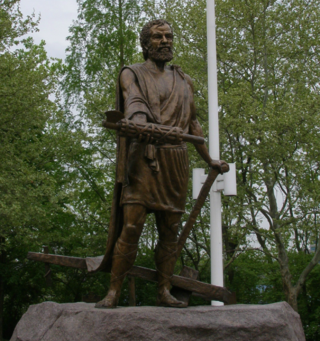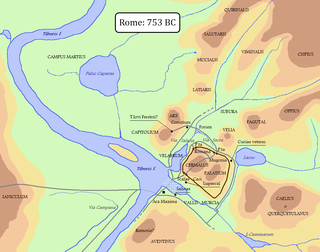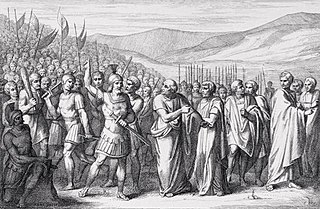Related Research Articles

Lucius Quinctius Cincinnatus was a Roman patrician, statesman, and military leader of the early Roman Republic who became a legendary figure of Roman virtue—particularly civic virtue—by the time of the late Republic.

The decemviri or decemvirs refer to official ten-man commissions established by the Roman Republic.

Marcus Manlius Capitolinus was consul of the Roman Republic in 392 BC. He was a brother of Aulus Manlius Capitolinus, consular tribune five times between 389 and 370 BC. The Manlii were one of the leading patrician gentes that dominated the politics of the early Republic.
Agrarian laws were laws among the Romans regulating the division of the public lands, or ager publicus. In its broader definition, it can also refer to the agricultural laws relating to peasants and husbandmen, or to the general farming class of people of any society.
The gens Papiria was a patrician family at ancient Rome. According to tradition, the Papirii had already achieved prominence in the time of the kings, and the first Rex Sacrorum and Pontifex Maximus of the Republic were members of this gens. Lucius Papirius Mugillanus was the first of the Papirii to obtain the consulship in 444 BC. The patrician members of the family regularly occupied the highest offices of the Roman state down to the time of the Punic Wars. Their most famous member was Lucius Papirius Cursor, five times consul between 326 and 313 BC, who earned three triumphs during the Samnite Wars. Most of the Papirii who held office under the later Republic belonged to various plebeian branches of the family. Although the most illustrious Papirii flourished in the time of the Republic, a number of the family continued to hold high office during the first two centuries of the Empire.
The Licino-Sextian rogations were a series of laws proposed by tribunes of the plebs, Gaius Licinius Stolo and Lucius Sextius Lateranus, enacted around 367 BC. Livy calls them rogatio – though he does refer to them at times as lex – as the plebeian assembly did not at the time have the power to enact leges (laws).
Lucius Sextius Sextinus Lateranus was a Roman tribune of the plebs and is noted for having been one of two men who passed the Leges Liciniae Sextiae of 368 BC and 367 BC. Originally, these were a set of three laws. One law provided that the interest already paid on debts should be deducted from the principal and that the payment of the rest of the principal should be in three equal annual installments. Another one provided restricted individual ownership of public land in excess of 500 iugeras and forbade the grazing of more than 100 cattle on public land. The most important law provided that one of the two consuls be a plebeian. Having been reelected nine times, Lucius Sextius Lateranus and Gaius Licinius Stolo held the plebeian tribunate for ten years. In 368 BC the laws regarding debt and land were passed, but the law regarding the consulship was rejected. In 367 BC this law was passed. In the same year the two tribunes of the plebs proposed a fourth law concerning the priests who were the custodians of the sacred Sibylline Books, and Lucius Sextius Lateranus was elected to serve as consul for the year 366 BC. Livy wrote that he was "the first of the plebeians to attain that honour."
Secessio plebis was an informal exercise of power by Rome's plebeian citizens between the 5th century BC and 3rd century BC., similar in concept to the general strike. During the secessio plebis, the plebs would abandon the city en masse in a protest emigration and leave the patrician order to themselves. Therefore, a secessio meant that all shops and workshops would shut down and commercial transactions would largely cease. This was an effective strategy in the Conflict of the Orders due to strength in numbers; plebeian citizens made up the vast majority of Rome's populace and produced most of its food and resources, while a patrician citizen was a member of the minority upper class, the equivalent of the landed gentry of later times. Authors report different numbers for how many secessions there were. M. Cary and H. H. Scullard state there were five between 494 BC and 287 BC.
Appius Claudius Crassus InregillensisSabinus was a Roman senator during the early Republic, most notable as the leading member of the ten-man board which drew up the Twelve Tables of Roman law around 451 BC. He is also probably identical with the Appius Claudius who was consul in 471 BC.

Arx is a Latin word meaning "citadel". In the ancient city of Rome, the arx was located on the northern spur of the Capitoline Hill, and is sometimes specified as the Arx Capitolina.
The gens Verginia or Virginia was a prominent family at ancient Rome, which from an early period was divided into patrician and plebeian branches. The gens was of great antiquity. It frequently filled the highest honors of the state during the early years of the Republic. The first of the family who obtained the consulship was Opiter Verginius Tricostus in 502 BC, the seventh year of the Republic. The plebeian members of the family were also numbered amongst the early tribunes of the people.
Titus Quinctius Capitolinus Barbatus was a Roman statesman and general who served as consul six times. Titus Quinctius was a member of the gens Quinctia, one of the oldest patrician families in Rome.

The first secessio plebis was a significant event in ancient Roman political and social history that occurred between 495 and 493 BC. It involved a dispute between the patrician ruling class and the plebeian underclass, and was one of a number of secessions by the plebs and part of a broader political conflict known as the conflict of the orders.
The Valerio-Horatian laws were three laws which were passed by the consuls of Rome for 449 BC, Lucius Valerius Poplicola Potitus and Marcus Horatius Barbatus. They restored the right of appeal to the people and introduced measures which were favourable to the plebeians. The consuls' actions came after a plebeian rebellion, the second plebeian secession, which overthrew the second decemvirate, which had ruled tyrannically. The two consuls had shown sympathy towards the plebeians and, as a result, had been chosen to negotiate the resolution of the rebellion. Their new laws quelled the plebeian unrest.
Gaius Claudius Ap. f. M. n. Sabinus Regillensis, was a member of the great patrician house of the Claudii at Ancient Rome. He held the consulship in 460 BC.
The gens Genucia was a prominent family of the Roman Republic. It was probably of patrician origin, but most of the Genucii appearing in history were plebeian. The first of the Genucii to hold the consulship was Titus Genucius Augurinus in 451 BC.
Publius Valerius Poplicola was consul of the Roman Republic in 475 BC and 460 BC, and interrex in 462 BC.
Gaius Valerius Potitus Volusus was a consul in 410 BC and consular tribune in 415, 407 and 404 BC of the Roman Republic.
Gnaeus Cornelius Cossus was a consular tribune in 414 BC and consul in 409 BC of the Roman Republic.
According to Roman tradition, it was a Decemvirate that drew up the Twelve Tables of Roman law.
References
- Livy, Ab urbe condita , book III, 15-29